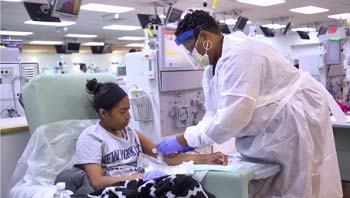Are you a Patient Care Technician (PCT) looking to explore new horizons while continuing your career in healthcare? If so, traveling PCT jobs might be the perfect fit for you. Combining your passion for helping others with the thrill of travel, this profession offers a unique opportunity to experience new cultures and landscapes while making a significant impact in various healthcare settings. In this guide, we’ll delve deep into traveling patient care technician jobs, including what they entail, potential destinations, pros and cons, travel tips, and so much more!
What is a Traveling Patient Care Technician?
A Traveling Patient Care Technician is a healthcare professional who provides direct patient care and support in various medical facilities across the country or even internationally. Unlike traditional PCT roles, traveling positions allow you to move from one location to another, often working on short-term contracts. This flexibility not only broadens your professional experience but also gives you the chance to explore different cities and cultures.
Responsibilities of a Traveling PCT
- Assisting patients with daily activities such as bathing, dressing, and eating.
- Monitoring vital signs including blood pressure, heart rate, and temperature.
- Administering medications and treatments as directed by a nurse or physician.
- Providing emotional support and education to patients and their families.
- Documenting patient information accurately and efficiently.

How to Become a Traveling Patient Care Technician
If you’re interested in pursuing a career as a traveling PCT, here are the essential steps:

1. Obtain the Necessary Education and Certification
While some positions may only require a high school diploma, most traveling PCT jobs ask for completion of a PCT training program. Additionally, obtaining certification from a recognized body, such as the National Healthcareer Association, can enhance your employability.
2. Gain Experience
Before venturing into travel positions, it’s beneficial to have a couple of years of experience in a traditional PCT role. This allows you to develop the necessary skills and confidence required for a traveling position.

3. Find a Reputable Staffing Agency
Partnering with a staffing agency specializing in travel healthcare can help you land your ideal PCT job. These agencies have connections with various healthcare facilities and can assist with job placement, housing arrangements, and other logistics.
Where Can You Work as a Traveling PCT?

The beauty of traveling PCT jobs is that they are available across a wide range of locations, from bustling cities to serene rural areas. Here are some popular destinations:
Top Destinations for Traveling PCTs

| Destination | Highlights | Average PCT Salary (per week) |
|---|---|---|
| New York City, NY | Vibrant culture, iconic landmarks, diverse cuisine | $1,200 |
| San Francisco, CA | Stunning landscapes, tech hub, vibrant arts scene | $1,300 |
| Miami, FL | Beautiful beaches, nightlife, multicultural | $1,150 |
| Chicago, IL | Deep-dish pizza, historic architecture, museums | $1,250 |
| Austin, TX | Live music, outdoor activities, quirky culture | $1,200 |
Pros and Cons of Traveling PCT Jobs

Pros
- Adventure: Experience new cities and cultures.
- Flexibility: Choose when and where you want to work.
- Higher Pay: Traveling PCTs often earn higher wages compared to local positions.
- Professional Growth: Gain diverse experience in different medical settings.
- Networking Opportunities: Meet healthcare professionals from various backgrounds.
Cons
- Frequent Moves: Constantly adjusting to new environments can be challenging.
- Isolation: Being away from family and friends may lead to feelings of loneliness.
- Variable Job Security: Contract work may not guarantee consistent employment.
- Housing Challenges: Finding temporary housing can sometimes be difficult.

Traveling as a PCT: Personal Experiences
As a traveling PCT, I’ve had the privilege of working in various states, each with its own unique charm. In Chicago, I spent weekends exploring iconic landmarks like Navy Pier and the Art Institute of Chicago. In Austin, I indulged in the lively music scene and tasted delicious barbecue. Every assignment not only elevated my career but also provided unforgettable memories and friendships I cherish to this day.
Travel Tips for Patient Care Technicians
1. Plan Your Travels
When accepting a traveling PCT job, ensure you have ample time to explore your new surroundings. Research local attractions, restaurants, and communities ahead of time to make the most of your off days.
2. Budget Wisely
Traveling can become expensive quickly, so set a budget for your travels, including housing, food, and entertainment. Remember to account for any tools or uniforms you may need to purchase as a PCT.
3. Network Build Connections
Stay in touch with fellow traveling technicians and local healthcare staff. Networking can lead to new job opportunities, friendships, and insider tips for exploring.
4. Stay Organized
Keep all important documents (licenses, certifications, travel itinerary) organized in one place. This will help minimize stress as you relocate to different facilities.
5. Embrace the Experience
Every new job is an adventure. Embrace the challenges and new experiences that come your way, and don’t forget to document your travels!
FAQs about Traveling Patient Care Technician Jobs
What qualifications do I need to become a traveling PCT?
You typically need a high school diploma, completion of a PCT training program, and certification. Some positions may require additional specialized training or experience.
How long are traveling PCT assignments?
Assignments usually range from 8 to 26 weeks, depending on the facility’s needs and your availability.
Do traveling PCT jobs offer benefits?
Many staffing agencies provide comprehensive benefits, including health insurance, travel stipends, and housing assistance.
How much do traveling PCTs earn?
The average weekly salary for traveling PCTs can range from $1,150 to $1,400, depending on location and experience.
Can I travel internationally as a PCT?
Yes, some agencies offer international assignments. However, additional licensing and permits may be required.
Conclusion: Your Journey Awaits!
Traveling patient care technician jobs are a fantastic way to combine your passion for healthcare with your love for adventure. By following the steps outlined in this guide, you’ll be well on your way to starting an exciting journey that not only enriches your career but also your life. So pack your bags, grab your stethoscope, and get ready to explore the world while making a difference in patient care!
Happy travels!